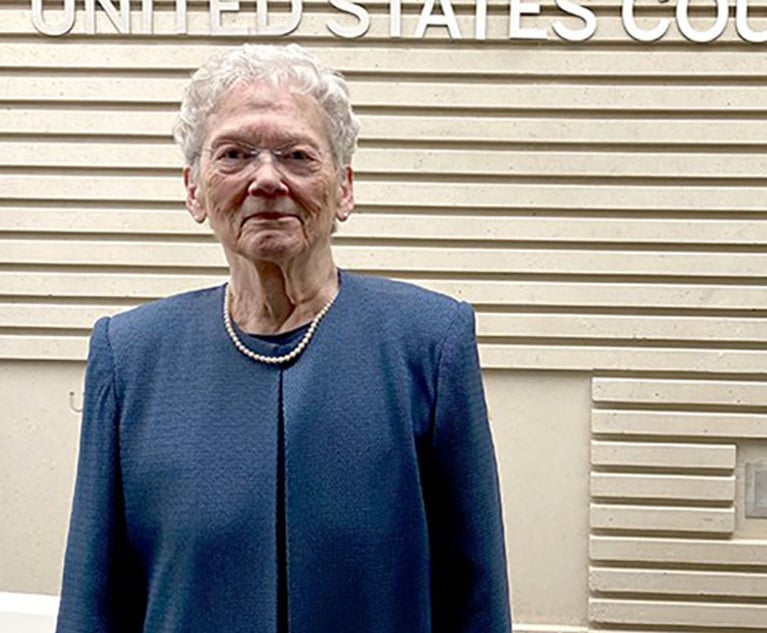 Photo credit: junrong / Shutterstock.com
Photo credit: junrong / Shutterstock.comJudge Rejects Tucker Arensberg's Second Attempt to Dodge Fraud Claim
A second federal judge has rejected Tucker Arensberg's second attempt to escape a lawsuit accusing the firm and one of its attorneys of engaging in fraudulent conduct in the sale of a $3 million Pennsylvania property to an oil-and-gas company.
August 15, 2019 at 06:10 PM
5 minute read
A second federal judge has rejected Tucker Arensberg’s second attempt to escape a lawsuit accusing the firm and one of its attorneys of engaging in fraudulent conduct in the sale of a $3 million Pennsylvania property to an oil-and-gas company.
Prime Energy and Chemical is alleging that Tucker Arensberg, through lawyer Michael Shiner, misrepresented its client’s ownership of a property in McKean County that Prime Energy contracted to buy. Prime Energy filed the lawsuit in March 2018. The parties entered mediation in December but the case was not resolved.
On Aug. 12, U.S. District Judge Yvette Kane of the Middle District of Pennsylvania denied Tucker Arensberg’s and Shiner’s motion to dismiss Prime Energy’s second amended complaint, finding that the previous ruling by U.S. District Chief Magistrate Judge Maureen Kelly of the Western District of Pennsylvania denying the firm’s motion to dismiss the original complaint constitutes the law of the case.
In its original complaint, Prime Energy alleged that it suffered damages of over $35 million from the alleged fraud, as well as $678,800 in lost deposits and other payments.
According to Prime Energy’s second amended complaint, filed Oct. 26, 2018, Tucker Arensberg represented Mark Thompson and Mid-East Oil Co.
Prime Energy alleged that the law firm misrepresented Thompson’s ownership of the 2,352-acre property in McKean County, referred to as the Swamp Angel Property. The property was owned by a company called MarcellX, the complaint said, which Thompson purported to own, but which was actually owned by another family.
In October 2015, Prime Energy paid a $600,000 deposit, which was delivered to an account owned by Thompson, as well as an additional $78,800 to further the sale of the $3 million property, the complaint said. But Prime Energy alleges that money never made it to the escrow account it was intended for.
According to the complaint, Prime Energy discovered in March 2016 that the actual owners of MarcellX were David Prushnok, G. Daniel Prushnok and John Prushnok. Prime Energy then entered a purchase agreement with the Prushnoks to acquire the Swamp Angel Property for $3 million.
“The Prushnoks were not represented by Tucker Arensberg and Shiner, who had misrepresented their representation of MarcellX in connection with the PSA, but by another firm,” the complaint said. “And Prime Energy had to pay MarcellX an additional $400,000 deposit and did not receive any credit toward the purchase with the $678,800 fraudulently misappropriated by defendants and Thompson.”
In May 2016, Shiner, of Tucker Arensberg, sent a letter to Prime Energy acknowledging that he did not represent MarcellX, the complaint said.
Thompson has been a defendant in at least two other cases related to the Swamp Angel Property, one of which resulted in a $2 million judgment against Thompson. Prime Energy alleged that Tucker Arensberg also failed to disclose those civil actions, as well as a series of violations charged by the Pennsylvania Department of Environmental Protection.
In denying the defendants’ first motion to dismiss in July 2018, Kelly said Prime Energy sufficiently alleged that Shiner and fellow Tucker Arensberg attorney Kenneth Carroll III made fraudulent misrepresentations, and “that Shiner directly received a pecuniary benefit from the transaction.” (Carroll was dismissed from the case last November.)
Examining Tucker Arensberg’s and Shiner’s second motion to dismiss, Kane said the defendants failed to point to any exceptions to the law of the case doctrine that would warrant departing from Kelly’s previous ruling.
“Indeed, Judge Kelly specifically found the following allegations sufficient to withstand scrutiny on a motion to dismiss: that ‘defendants represented in the PSA that “the lease and the wells [the Swamp Angel Property]: (a) are not subject to any outstanding injunction, judgment, order, decree, ruling, or charge; and (b) are not the subject of any pending or threatened claim, demand, filing, cause of action, administrative proceeding, governmental action[,] or other litigation,”‘” Kane said. “Accordingly, plaintiff’s assertion of facts in the second amended complaint pertaining to additional litigation and environmental enforcement proceedings comports with Judge Kelly’s determination that plaintiff has proffered sufficient factual allegations to support their claim that defendants fraudulently concealed the existence of pending actions pertaining to the property for purposes of a fraud claim.”
Kane added that, even if the law of the case doctrine didn’t apply, the plaintiff’s fraud claim was still “plainly sufficient” to be allowed to proceed.
“In the instant case, plaintiff has averred that the alleged misrepresentation regarding other actions involving the property was material to its entry into the PSA and monetary payments made in connection therewith, and had these actions been made known, plaintiff would not have engaged in the transactions described in the second amended complaint,” Kane said. ”
Counsel for Tucker Arensberg, James Schadel of Burns White in Pittsburgh, declined to comment.
Counsel for Prime Energy, Charles B. Manuel Jr. of Manuel & Associates in New York, also declined to comment.
This content has been archived. It is available through our partners, LexisNexis® and Bloomberg Law.
To view this content, please continue to their sites.
Not a Lexis Subscriber?
Subscribe Now
Not a Bloomberg Law Subscriber?
Subscribe Now
NOT FOR REPRINT
© 2024 ALM Global, LLC, All Rights Reserved. Request academic re-use from www.copyright.com. All other uses, submit a request to [email protected]. For more information visit Asset & Logo Licensing.
You Might Like
View All

Middle District of Pennsylvania's U.S. Attorney Announces Resignation
2 minute read

Trending Stories
- 1'Largest Retail Data Breach in History'? Hot Topic and Affiliated Brands Sued for Alleged Failure to Prevent Data Breach Linked to Snowflake Software
- 2Former President of New York State Bar, and the New York Bar Foundation, Dies As He Entered 70th Year as Attorney
- 3Legal Advocates in Uproar Upon Release of Footage Showing CO's Beat Black Inmate Before His Death
- 4Longtime Baker & Hostetler Partner, Former White House Counsel David Rivkin Dies at 68
- 5Court System Seeks Public Comment on E-Filing for Annual Report
Who Got The Work
Michael G. Bongiorno, Andrew Scott Dulberg and Elizabeth E. Driscoll from Wilmer Cutler Pickering Hale and Dorr have stepped in to represent Symbotic Inc., an A.I.-enabled technology platform that focuses on increasing supply chain efficiency, and other defendants in a pending shareholder derivative lawsuit. The case, filed Oct. 2 in Massachusetts District Court by the Brown Law Firm on behalf of Stephen Austen, accuses certain officers and directors of misleading investors in regard to Symbotic's potential for margin growth by failing to disclose that the company was not equipped to timely deploy its systems or manage expenses through project delays. The case, assigned to U.S. District Judge Nathaniel M. Gorton, is 1:24-cv-12522, Austen v. Cohen et al.
Who Got The Work
Edmund Polubinski and Marie Killmond of Davis Polk & Wardwell have entered appearances for data platform software development company MongoDB and other defendants in a pending shareholder derivative lawsuit. The action, filed Oct. 7 in New York Southern District Court by the Brown Law Firm, accuses the company's directors and/or officers of falsely expressing confidence in the company’s restructuring of its sales incentive plan and downplaying the severity of decreases in its upfront commitments. The case is 1:24-cv-07594, Roy v. Ittycheria et al.
Who Got The Work
Amy O. Bruchs and Kurt F. Ellison of Michael Best & Friedrich have entered appearances for Epic Systems Corp. in a pending employment discrimination lawsuit. The suit was filed Sept. 7 in Wisconsin Western District Court by Levine Eisberner LLC and Siri & Glimstad on behalf of a project manager who claims that he was wrongfully terminated after applying for a religious exemption to the defendant's COVID-19 vaccine mandate. The case, assigned to U.S. Magistrate Judge Anita Marie Boor, is 3:24-cv-00630, Secker, Nathan v. Epic Systems Corporation.
Who Got The Work
David X. Sullivan, Thomas J. Finn and Gregory A. Hall from McCarter & English have entered appearances for Sunrun Installation Services in a pending civil rights lawsuit. The complaint was filed Sept. 4 in Connecticut District Court by attorney Robert M. Berke on behalf of former employee George Edward Steins, who was arrested and charged with employing an unregistered home improvement salesperson. The complaint alleges that had Sunrun informed the Connecticut Department of Consumer Protection that the plaintiff's employment had ended in 2017 and that he no longer held Sunrun's home improvement contractor license, he would not have been hit with charges, which were dismissed in May 2024. The case, assigned to U.S. District Judge Jeffrey A. Meyer, is 3:24-cv-01423, Steins v. Sunrun, Inc. et al.
Who Got The Work
Greenberg Traurig shareholder Joshua L. Raskin has entered an appearance for boohoo.com UK Ltd. in a pending patent infringement lawsuit. The suit, filed Sept. 3 in Texas Eastern District Court by Rozier Hardt McDonough on behalf of Alto Dynamics, asserts five patents related to an online shopping platform. The case, assigned to U.S. District Judge Rodney Gilstrap, is 2:24-cv-00719, Alto Dynamics, LLC v. boohoo.com UK Limited.
Featured Firms
Law Offices of Gary Martin Hays & Associates, P.C.
(470) 294-1674
Law Offices of Mark E. Salomone
(857) 444-6468
Smith & Hassler
(713) 739-1250





